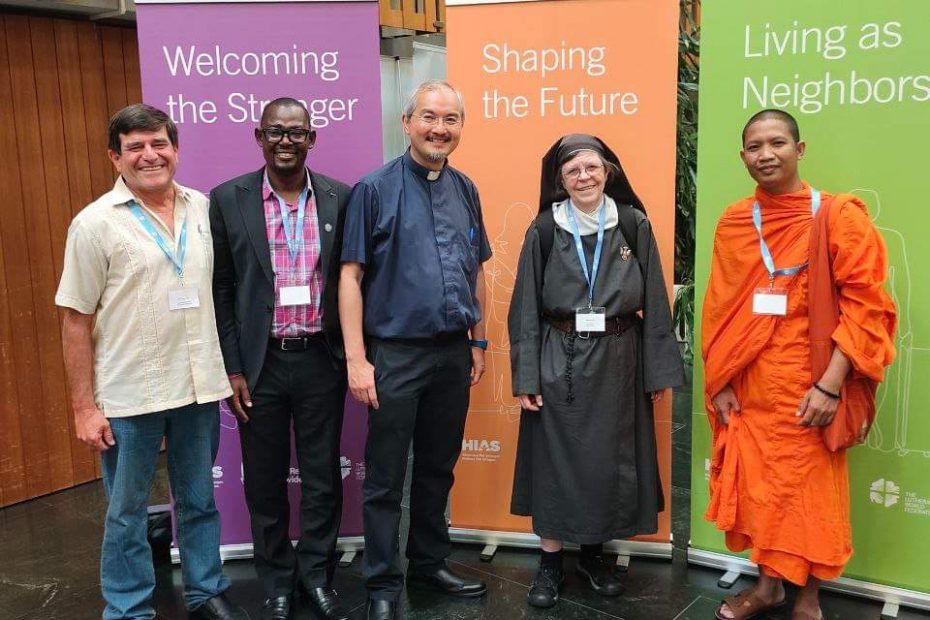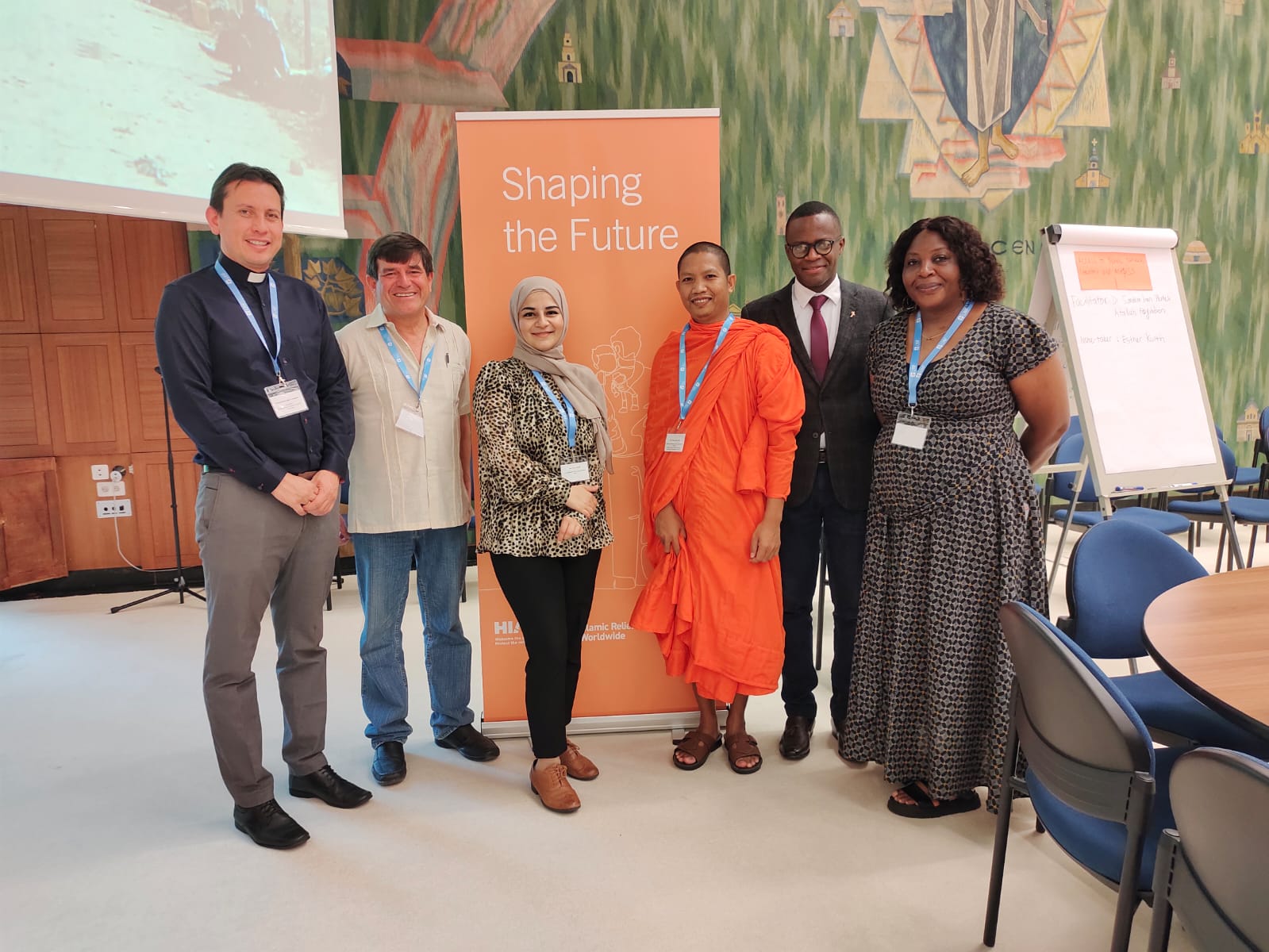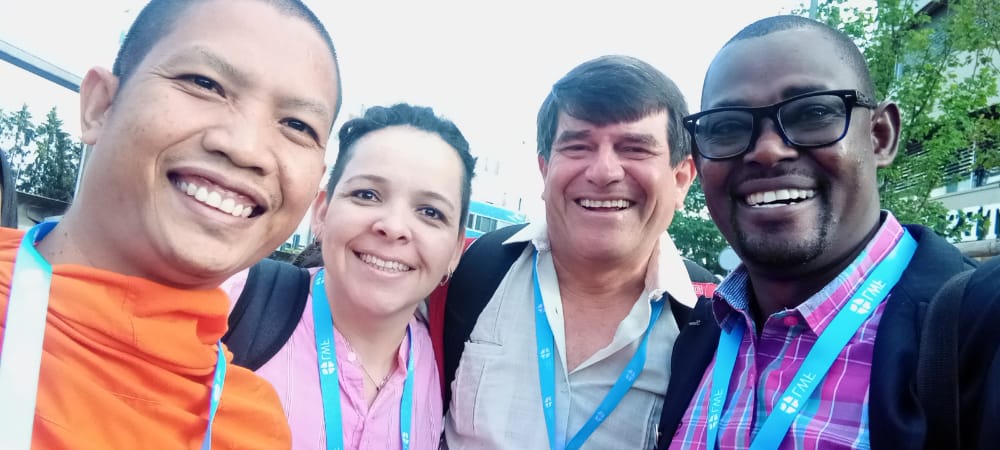DÁNDOLE FORMA AL FUTURO
Versión español:
Los días 20 y 21 de junio de 2022, en Ginebra, Suiza, se llevó a cabo la Conferencia “Dándole la bienvenida a nuestros vecinos. Dándole forma al Futuro”. Esta Conferencia fue organizada por las organizaciones Islamic Relief Worldwide, Federación Luterana Mundial y HIAS. Participaron más de 80 personas, procedentes de diversos países de diferentes regiones del mundo, de diferentes credos religiosos y formas de espiritualidad, en un esfuerzo de verdadero diálogo ecuménico en favor de los derechos de las personas desplazadas y refugiadas.
A la misma fue invitado también Juan José Hurtado, Director de la Asociación Pop No’j de Guatemala. En ésta, compartió sobre la espiritualidad Maya que no es una religión como tal, pero que tiene principios, valores y prácticas que buscan el equilibrio y armonía entre seres humanos, Madre Naturaleza y energías del Cosmos, para alcanzar el Buen Vivir.
A continuación, compartimos parte de un artículo publicado de forma conjunta entre Waseem Ahmad, Anne Burghardt y Mark Hetfield (https://religionnews.com/2022/06/22/answering-the-refugee-crisis-as-a-matter-of-faith/)
Frente a la crisis de refugiados sin precedentes, las organizaciones Islamic Relief Worldwide, Lutheran World Federation y HIAS, una organización humanitaria judía internacional que brinda apoyo crítico a los refugiados, están fortaleciendo su cooperación para brindar una respuesta mejor, más coordinada y efectiva. Estas organizaciones tienen décadas de experiencia sirviendo a refugiados y comunidades de acogida en otros lugares, especialmente en países en desarrollo donde se encuentran la gran mayoría de los refugiados del mundo.
Como parte de nuestra asociación y para conmemorar el Día Mundial del Refugiado, las tres organizaciones copatrocinaron una conferencia internacional en Ginebra los días 20 y 21 de junio, con el objetivo de mejorar nuestra comprensión del trabajo que están realizando los grupos religiosos locales en todo el mundo en la implementación del Pacto Mundial sobre Refugiados. También abordó la cuestión de cómo apoyar mejor a esos grupos en su trabajo.
Gillian Triggs, alta comisionada adjunta para la protección en la Oficina del Alto Comisionado de las Naciones Unidas para los Refugiados, inauguró la conferencia. Asimismo, personal superior de las oficinas regionales de ACNUR y expertos en género, protección infantil, alianzas y consolidación de la paz cofacilitaron algunas sesiones. Su participación fue vital y nos complació escuchar compromisos concretos del ACNUR para continuar con esta asociación, en particular para aumentar su alfabetización religiosa.
En particular, los grupos religiosos pueden ayudar a integrar a los refugiados y solicitantes de asilo en sus nuevos contextos utilizando sus redes, influencia y autoridad moral para encontrar medios de vida para los desplazados, promover la comprensión y combatir la xenofobia en la nación anfitriona. Los grupos religiosos deben buscar profundizar sus asociaciones y sus conexiones con las agencias humanitarias y de desarrollo globales.
En la conferencia se planteó algunos modelos clave para este tipo de redes. A través de una iniciativa llamada Símbolos de Esperanza, la Federación Luterana Mundial apoya a las iglesias miembros en los países africanos para que brinden atención pastoral y psicosocial a los retornados, junto con capacitación en habilidades y apoyo a los medios de subsistencia.
Una iniciativa de Interfaith Women en Uganda, el país que alberga el mayor número de refugiados en África, ayuda a desarrollar herramientas educativas para jóvenes refugiados y miembros de las comunidades de acogida para promover la convivencia y prevenir conflictos por recursos escasos.
En respuesta a la guerra en Ucrania, HIAS está ampliando su red Welcome Circle de sinagogas y grupos comunitarios locales que asumen la responsabilidad de reasentar a los refugiados en sus comunidades, una iniciativa lanzada para reasentar a los evacuados de Afganistán.
Ofrecer cobijo y acogida a los más necesitados es algo más que una obligación profesional para los miembros de estas organizaciones de motivación religiosa: es un mandamiento escrito en sus textos religiosos que sigue inspirando palabras y acciones.
“Tuve hambre y me disteis de comer, tuve sed y me disteis de beber, era forastero y me invitasteis a entrar”, dice Jesús a sus oyentes en el Evangelio de San Mateo.
La Torá instruye a los judíos 36 veces a cuidar al extraño, mucho más de lo que les ordena observar el sábado o cualquier otra ley, como en el Libro del Éxodo: “No oprimirás al extraño, porque conoces los sentimientos del extraño”. forastero, habiendo sido vosotros mismos forasteros en la tierra de Egipto.”
De manera similar, el Corán llama a los musulmanes a ser protectores y ayudantes de “aquellos hombres, mujeres y niños oprimidos que gritan ‘¡Señor, sálvanos de esta ciudad donde la gente es opresora!’”. Otro verso dice: “Si te buscan ayuda contra la persecución, es vuestro deber asistirlos”.
a
Se reflexionó sobre las eternas preguntas “¿Quién es mi prójimo?” y “¿Qué puedo hacer para ayudar?”
Rogamos que se una a nosotros en sus comunidades de bienvenida inspirada en la fe tomando medidas para una política más empática, generosa y de brazos abiertos para todos los refugiados, sin importar de dónde sean y cuál es su fe.
(Waseem Ahmad es director ejecutivo de Islamic Relief Worldwide. La reverenda Anne Burghardt es secretaria general de la Federación Luterana Mundial. Mark Hetfield es director ejecutivo de HIAS. Las opiniones expresadas en este comentario no reflejan necesariamente las de Religion News Service).
English version:
On June 20 and 21 of 2022, in Geneva, Switzerland, was held the Conference “Welcoming our neighbors. Shaping the Future”. This Conference was organized by the organizations Islamic Relief Worldwide, the Lutheran World Federation and HIAS. More than 80 people participated, coming from various countries of different regions of the world, of different religious creeds and forms of spirituality, in an effort of true ecumenical dialogue in favor of the rights of displaced persons and refugees.
Juan José Hurtado, Director of the Pop No’j Association of Guatemala, was also invited to the event. He shared about Maya spirituality, which is not a religion as such, but has principles, values and practices that seeks balance and harmony among human beings, Mother Nature and energies of the Cosmos, to achieve Good Living.
Below, we share part of an article published jointly by Waseem Ahmad, Anne Burghardt, and Mark Hetfield (https://religionnews.com/2022/06/22/answering-the-refugee-crisis-as-a-matter- of-faith/)
Faced with the unprecedented refugee crisis, our three organizations — Islamic Relief Worldwide, the Lutheran World Federation and HIAS, an international Jewish humanitarian organization that provides critical support to refugees — are strengthening their cooperation to provide a better, more coordinated, and effective response. These organizations have decades of experience serving refugees and host communities in other places, especially in developing countries where the vast majority of the world’s refugees are located.
As a capstone to our partnership, and to mark World Refugee Day, the three organizations co-hosted an international conference in Geneva on June 20 and 21, with the aim of improving our understanding of the work that is being done by local faith groups around the world in implementing the Global Compact on Refugees. It also tackled the question of how to support those groups in their work.
Principio del formulario
Gillian Triggs, assistant high commissioner for protection at the Office of the U.N. High Commissioner for Refugees, opened the conference with us, and senior staff from UNHCR’s regional bureaus and gender, child protection, partnerships and peacebuilding experts co-facilitated some sessions. Their participation was vital, and we were pleased to hear concrete commitments from UNHCR to continuing this partnership, in particular to increasing their faith literacy.
… Faith groups can help integrate refugees and asylum-seekers into their new contexts using our networks, influence and moral authority to find livelihoods for the displaced and to promote understanding and fight xenophobia in the host nation. Faith groups should look to deepen their partnerships and their connections with global humanitarian and development agencies.
At the conference we lifted up some key models for such networks. Through an initiative called Symbols of Hope, the Lutheran World Federation supports member churches in African countries to provide pastoral and psychosocial care for returnees, along with skills training and livelihoods support.
An initiative by Interfaith Women in Uganda, the country that is host to the largest number of refugees in Africa, helps to develop educational tools for young refugees and members of host communities to promote coexistence and prevent conflict over scarce resources.
In response to the war in Ukraine, HIAS is expanding its Welcome Circle network of synagogues and local community groups that take on the responsibility of resettling refugees in their communities, an initiative launched to resettle evacuees from Afghanistan.
Offering shelter and a welcome to those most in need is more than just a professional obligation for members of these religiously motivated organizations: It is a commandment written in their religious texts that continues to inspire words and actions.
“I was hungry and you gave me something to eat, I was thirsty and you gave me something to drink, I was a stranger and you invited me in,” Jesus tells his listeners in St. Matthew’s Gospel.
The Torah instructs Jews 36 times to care for the stranger — far more than it commands them to observe the Sabbath or any other law — such as in the Book of Exodus: “You shall not oppress a stranger, for you know the feelings of the stranger, having yourselves been strangers in the land of Egypt.”
Similarly, the Quran calls on Muslims to be protectors and helpers to “those oppressed men, women and children who cry out ‘Lord, rescue us from this town where people are oppressors!’” Another verse reads, “If they seek help from you against persecution, it is your duty to assist them.”
This is a challenging task as we witness the scale of the crisis unfolding in Ukraine and the continued suffering of people who have fled from conflict and oppression in Syria, Afghanistan, Venezuela, Ethiopia and elsewhere. We urge all people of goodwill to pray for peace, consider volunteering and donate to refugee relief efforts.
As we reflect on the timeless questions “Who is my neighbor?” and “What can I do to help?,” we pray you will join us in your communities of faith-inspired welcome by taking action for a more empathetic, generous and open-armed policy to all refugees, no matter where they are from and what their faith is.
(Waseem Ahmad is CEO of Islamic Relief Worldwide. The Rev. Anne Burghardt is general secretary, Lutheran World Federation. Mark Hetfield is CEO of HIAS. The views expressed in this commentary do not necessarily reflect those of Religion News Service.)


